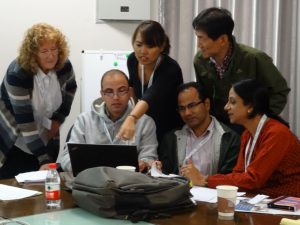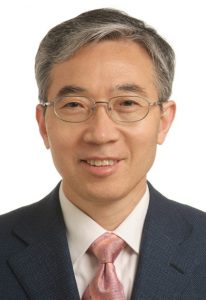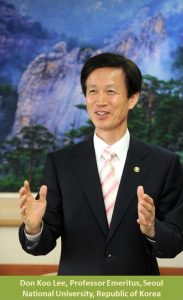Systematic Review in Forest Science – Learning from Traditional Forest Knowledge
Report by Dr Gillian Petrokofsky, University of Oxford, 23 October 2016
http://www.iufro.org/science/special/spdc/actproj/tws-beij/
Aims of the training

Dr. Gillian Petrokofsky, Biodiversity Institute Oxford, and trainees. Photo: Eva Schimpf, IUFRO-SPDC
The 3-day training workshop introduced participants to systematic review as a powerful tool in evidence synthesis.
The tool is used to improve decision-making and any policy formulation that draws on scientific evidence. The workshop explored examples from forestry and natural resource management.
Participants applied techniques of systematic review to develop mini-Protocols focused on how traditional knowledge forest could inform current forest management strategies/policy. Read more…
Interview with Professor Zhang Shougong, Chinese Academy of Forestry (CAF)

Professor Zhang Shougong, Chinese Academy of Forestry (CAF)
Keynote speaker at the IUFRO Regional Congress for Asia and Oceania –
Forests for Sustainable Development: The Role of Research
Professor Zhang, the IUFRO Regional Congress for Asia and Oceania 2016 is jointly organized by IUFRO and the Chinese Academy of Forestry. This is the first Congress of its kind to be held in the region of Asia and Oceania and will offer an extraordinary opportunity for enhancing forest science cooperation. You are one of the leading scientists in silviculture and forest management in China and have a long experience in the establishment of planted forests on the one hand, and sustainable forest management on the other hand. The Congress will particularly focus on these two areas with its themes “Planted forests for fostering a greener economy”, and “Sustainable forest management for enhanced provision of ecosystem services”. Read more…
CITES CoP17 – Major Consensus on Stronger Actions to Combat Illegal Wildlife Trade
IUFRO-led Global Forest Expert Panel on Illegal Timber Trade Informed about Current Assessment
The 17th meeting of the Conference of the Parties (CoP 17) to the Convention on International Trade in Endangered Species of Wild Fauna and Flora (CITES) took place from 24 September to 5 October 2016 in Johannesburg, South Africa. It was the largest CITES meeting to date, with more than 3,500 participants representing 152 governments, international organizations, non-governmental organizations and media. (http://www.iisd.ca/cites/cop17/) Read more…
Interview with Don Koo Lee, Professor Emeritus, Seoul National University, Republic of Korea
Keynote speaker at the IUFRO Regional Congress for Asia and Oceania – Forests for Sustainable Development: The Role of Research
 Professor Lee, the overarching theme of this IUFRO Regional Congress for Asia and Oceania is “Forests for Sustainable Development: The Role of Research”. When you gave your opening speech as President of IUFRO at the XXIII IUFRO World Congress 2010 in Seoul, you stressed the importance of sustainability, equity, growth and development and the need to understand that “Forest is our life, our hope, and our future.”
Professor Lee, the overarching theme of this IUFRO Regional Congress for Asia and Oceania is “Forests for Sustainable Development: The Role of Research”. When you gave your opening speech as President of IUFRO at the XXIII IUFRO World Congress 2010 in Seoul, you stressed the importance of sustainability, equity, growth and development and the need to understand that “Forest is our life, our hope, and our future.”
Q: What would you say has been achieved in the quest for sustainable development since the 2010 IUFRO World Congress?
A: Since then the important role of forests for life, hope and future has been further strengthened internationally by collaborative partnership activities, (e.g. co-research, advanced studies, site visits, trainings, conferences, etc.) especially in Asia, Africa and Latin America, as well as nationally by the Forest For Life National Movement in Korea. Read more…
IUFRO Spotlight #40 – Biological Invasions: An Undesired Effect of Globalization
Increasingly, the trend of globalization causes many species to be moved around the world and into areas in which they have never before existed.
Unfortunately, when organisms are moved out of the regions where they evolved and transported to new regions where there are few or no natural limiting factors – predators, as an example – populations can sometimes explode with profound impacts on the new and vulnerable territory. Read more…
